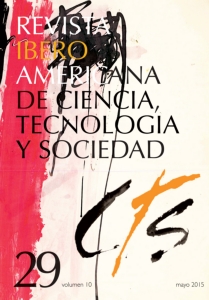Being an engineer
DOI:
https://doi.org/10.52712/issn.1850-0013-524Keywords:
engineer, utilitarianism, culture, technologyAbstract
This paper is an essay that intends to answer the question: what does it mean to be an engineer? It starts by describing the distinctive limitations of utilitarianism to arrive at a full definition, and makes reference to the main dehumanizing consequences: suffocation of his most genuine humanity, powers that restrain him, and the failure of university, as part of current imagery, to impart “culture” in Ortega and Gasset’s terms. Finally, this paper gives an answer from the human ecology perspective, that serves as guide to understand the role of the engineer within the human ecosystem, and from which culture emerges (in the meaning given to the term) as a necessary and foundational element in the essence of being an engineer.
Downloads
References
ALFARAZ, C. (2009): “Cultura y tecnología: el caso del automóvil y sus valores asociados”, Portafolio CTS, Revista Iberoamericana de Ciencia, Tecnología y Sociedad (CTS). Disponible en: http://www.revistacts.net/files/Portafolio/alfaraz_ editado.pdf.
CASTELLS, M. (2001): “Internet y la Sociedad Red”, La Factoría. Disponible en: http://www.revistalafactoria.eu/articulo.php?id=185.
DE MIGUEL, M. E. (2003): Las batallas secretas de Belgrano, Buenos Aires, Planeta.
HERMANOS GRIMM (1812): “La Cenicienta”. Disponible en: http://www.grimmstories. com/es/grimm_cuentos/la_cenicienta.
MANGABIERA UNGER, R. (2010): La Alternativa de la Izquierda, Buenos Aires, Fondo de Cultura Económica.
ORTEGA Y GASSET, J. (1930): Misión de la Universidad. Disponible en: http://www.esi2.us.es/~fabio/mision.pdf.
PRÓ, D. F. (2013): Alberto Rougés, San Miguel de Tucumán, Fundación Miguel Lillo, Centro Cultural Alberto Rougés.
ROJAS PAZ, P. (1974): “El Camino”, en G. A. Bravo Figueroa: 27 Cuentos del Norte Argentino, San Miguel de Tucumán, Atenas, pp 204-215.
Downloads
Published
How to Cite
Issue
Section
License
Copyright (c) 2023 CC Attribution 4.0

This work is licensed under a Creative Commons Attribution 4.0 International License.
All CTS's issues and academic articles are under a CC-BY license.
Since 2007, CTS has provided open and free access to all its contents, including the complete archive of its quarterly edition and the different products presented in its electronic platform. This decision is based on the belief that offering free access to published materials helps to build a greater and better exchange of knowledge.
In turn, for the quarterly edition, CTS allows institutional and thematic repositories, as well as personal web pages, to self-archive articles in their post-print or editorial version, immediately after the publication of the final version of each issue and under the condition that a link to the original source will be incorporated into the self-archive.











